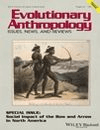
EVOLUTIONARY ANTHROPOLOGY
Scope & Guideline
Unraveling the Complexities of Human Health and Evolution
Introduction
Aims and Scopes
- Interdisciplinary Research on Human Evolution:
The journal emphasizes a multidisciplinary approach, integrating insights from genetics, paleontology, anthropology, and ecology to provide a comprehensive understanding of human evolution. - Behavioral Ecology of Primates and Hominins:
A core focus is on the behavioral ecology of primates and their evolutionary significance, exploring how behavior and social structures have evolved over time. - Cultural Evolution and Its Biological Underpinnings:
The journal investigates the interplay between culture and biology, analyzing how cultural practices influence evolutionary processes and vice versa. - Innovative Methodologies in Anthropological Research:
The journal highlights the use of advanced methodologies, including genetic analysis, morphometric studies, and experimental archaeology, to investigate evolutionary questions. - Human-Nonhuman Animal Interactions:
There is a significant focus on understanding interactions between humans and nonhuman animals, examining how these relationships have evolved and their implications for both groups.
Trending and Emerging
- Human-Nature Interconnections:
An increasing number of studies are exploring the connections between human evolution and environmental factors, focusing on how ecological changes have influenced human and primate adaptations. - Interdisciplinary Approaches to Health and Disease:
Emerging research on evolutionary medicine and the impact of evolutionary perspectives on understanding chronic diseases and health disparities is gaining prominence. - Cultural Evolution and Its Impact on Human Development:
There is a growing interest in how cultural practices shape evolutionary trajectories, particularly concerning cooperation, social structures, and the evolution of complex behaviors. - Advancements in Genetic and Morphometric Analyses:
Innovative methodologies, particularly in genetic research and morphometrics, are increasingly being utilized to provide new insights into evolutionary patterns and processes. - Primate Conservation and Ethical Considerations:
Research focusing on the conservation of primates and the ethical implications of anthropological studies are emerging as critical themes, reflecting a broader societal concern for biodiversity and animal welfare.
Declining or Waning
- Traditional Paleoanthropological Debates:
Discussions centered on traditional paleoanthropological topics, such as rigid classifications of hominin species, appear to be less frequent as the field shifts towards more integrative and dynamic models of human evolution. - Focus on Neanderthal Studies:
Research specifically dedicated to Neanderthals has decreased, possibly due to the increasing interest in broader evolutionary narratives that include various hominin lineages and their interactions. - Reductionist Approaches to Evolutionary Biology:
There is a noticeable decline in reductionist perspectives that focus solely on genetic or biological determinants of behavior, as the field increasingly embraces more holistic and integrative approaches. - Overemphasis on Eurocentric Perspectives:
The journal has moved away from Eurocentric narratives in evolutionary studies, reflecting a growing emphasis on global perspectives and inclusivity in research. - Static Models of Human Behavior:
Research that employs static models of human behavior without considering ecological and cultural contexts is becoming less common, as there is a push towards understanding dynamic and adaptive behaviors.
Similar Journals

EVOLUTIONARY ECOLOGY
Advancing Knowledge at the Intersection of Evolution and EcologyEVOLUTIONARY ECOLOGY is a prestigious academic journal published by SPRINGER, exploring the intricate relationships between evolutionary processes and ecological dynamics since its inception in 1987. As a key resource in the field of Ecology, Evolution, Behavior, and Systematics, the journal is recognized for its impactful contributions, holding a commendable Q2 quartile ranking in its category as of 2023. With an emphasis on empirical and theoretical studies that bridge evolutionary biology with ecological principles, EVOLUTIONARY ECOLOGY is essential for researchers, practitioners, and students aiming to deepen their understanding of biodiversity, adaptation, and ecosystem functioning. Although it currently does not offer open access, the journal maintains a commitment to disseminating high-quality research that influences both foundational knowledge and practical applications in the field. Located in the Netherlands, the journal continues to serve a global audience, making significant contributions to advancing ecological and evolutionary research through rigorous scientific discourse and innovation.

HOMO-JOURNAL OF COMPARATIVE HUMAN BIOLOGY
Pioneering Studies in Comparative Human SciencesHOMO - Journal of Comparative Human Biology is a prestigious academic journal dedicated to advancing the field of comparative human biology, offering a platform for researchers, professionals, and students to disseminate cutting-edge findings. Published by E Schweizerbart'sche Verlagsbuchhandlung in Germany, this journal has been a crucial resource since its inception in 1950, featuring a rich archive of studies until 2023. It holds a Q3 quartile ranking in Anthropology and a Q4 quartile ranking in Miscellaneous Medicine, reflecting its significance and influence within the academic community. Although not an Open Access journal, it provides a wealth of robust research that intersects with various disciplines within the anthropological sciences. Researchers looking for a wide array of comparative studies and insights into human biology will find HOMO an invaluable addition to their scholarly resources.
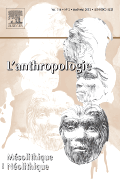
ANTHROPOLOGIE
Fostering Dialogue Between Anthropology and PhilosophyANTHROPOLOGIE, published by Elsevier France - Éditions Scientifiques Médicales Elsevier, is a leading academic journal dedicated to advancing the fields of Anthropology and the History and Philosophy of Science. With a publication history that dates back to 1947, this esteemed journal has steadily carved its niche within the scholarly community, achieving a commendable Q2 rank in both the aforementioned categories in 2023. Although it does not offer Open Access, ANTHROPOLOGIE provides robust access options through institutional subscriptions, ensuring that researchers and practitioners alike can delve into its rich repository of knowledge. The journal's impact is underscored by its competitive Scopus rankings, particularly its position within the 65th percentile for History and Philosophy of Science and 56th percentile within Anthropology. Through rigorous peer-reviewed articles that illuminate a wide array of anthropological inquiries and philosophical debates, ANTHROPOLOGIE continues to be an essential resource for those committed to exploring the complexities of human behavior, culture, and scientific understanding in an ever-evolving world.
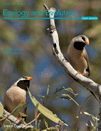
Ecology and Evolution
Championing open access to transformative ecological insights.Ecology and Evolution is a leading open-access journal published by WILEY, dedicated to advancing knowledge in the fields of ecology, evolution, and behavior. Since its inception in 2011, the journal has established itself as a critical platform, garnering a significant impact factor and maintaining a prestigious Q1 ranking in multiple categories, including Ecology, Evolution, Behavior and Systematics, and Nature and Landscape Conservation as of 2023. With its continuous commitment to high-quality research, Ecology and Evolution provides a vital conduit for dissemination among researchers, professionals, and students alike. The journal's open-access model ensures that groundbreaking findings are accessible to a global audience, fostering collaboration and innovation across various ecological and evolutionary disciplines. The editorial team invites submissions that explore the intricate relationships between organisms and their environments, aiming to inspire future research that addresses pressing environmental challenges. The journal's rigorous peer-review process guarantees the integrity and quality of published work, reinforcing its position as a frontrunner in its field.
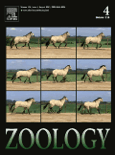
ZOOLOGY
Fostering global collaboration in zoological sciences.ZOOLOGY, an esteemed journal published by Elsevier GmbH, stands at the forefront of research in the Animal Science and Zoology fields. With a notable impact factor and recognized as a Q1 category journal in its discipline, ZOOLOGY is highly regarded among researchers, ranking #98 out of 490 in Scopus rankings. Founded in 1994 and continuing through to 2024, the journal aims to publish cutting-edge, peer-reviewed articles that contribute significantly to the understanding of zoological sciences. Based in Munich, Germany, ZOOLOGY provides both subscription and open access options, ensuring that influential research reaches a wider audience. It serves as an essential platform for disseminating innovative findings, connecting scholars globally, and fostering interdisciplinary collaboration to advance zoological knowledge.
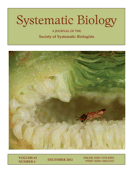
Systematic Biology
Unraveling the complexities of biodiversity through rigorous research.Systematic Biology is a premier journal published by Oxford University Press, dedicated to advancing the field of systematic biology through rigorous research and comprehensive reviews. Established in 1952, this esteemed journal has become a cornerstone of scholarship in Ecology, Evolution, Behavior and Systematics and Genetics, consistently ranking in the Q1 category as of 2023. With an impressive Scopus ranking—19th in Ecology and Evolution and 23rd in Genetics—Systematic Biology offers a platform for the dissemination of groundbreaking research, novel methodologies, and critical discussions that shape our understanding of biological diversity and evolution. While the journal does not currently offer open access options, it maintains a strong commitment to quality and integrity in publishing, ensuring that every article contributes meaningfully to the scientific community. Researchers, professionals, and students alike will find valuable insights and a wealth of knowledge within its pages, supporting their work and fostering a deeper appreciation for the intricate web of life.
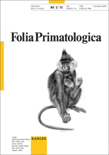
FOLIA PRIMATOLOGICA
Fostering Understanding of Primates in a Global ContextFOLIA PRIMATOLOGICA is a prestigious academic journal published by BRILL, focusing on the interdisciplinary fields of animal science and zoology, as well as ecology and evolutionary biology. With an ISSN of 0015-5713 and E-ISSN 1421-9980, the journal has been a significant contributor to the understanding of primatology since its inception in 1963 and continues to disseminate impactful research through 2024. The journal is recognized in the Q2 quartile for Animal Science and Zoology and Q3 for Ecology, Evolution, Behavior, and Systematics, showcasing a solid reputation within the academic community. Both Scopus rankings and percentiles indicate its influence, with a rank of 137/490 in Animal Science and 277/721 in Ecology and Evolution, reflecting its relevance and commitment to promoting high-quality research. Though it does not operate on an open-access model, FOLIA PRIMATOLOGICA remains a vital resource for researchers, professionals, and students alike, striving to advance the understanding of primates and their ecological contexts within a global framework.

Evolutionary Bioinformatics
Exploring the dynamic landscape of evolutionary bioinformatics.Evolutionary Bioinformatics, published by SAGE Publications Ltd, is a pioneering open-access journal established in 2005, dedicated to advancing the field of evolutionary biology through innovative computational techniques and bioinformatics. With an ISSN of 1176-9343, it serves as a critical platform for researchers, professionals, and students to disseminate impactful findings and foster collaboration across disciplines. The journal spans a broad scope, contributing significantly to the areas of Ecology, Evolution, Behavior and Systematics, and Genetics, as evidenced by its respectable Scopus rankings and quartile placements in 2023. With a commitment to providing comprehensive, peer-reviewed research articles and tools for sharing knowledge, Evolutionary Bioinformatics plays an essential role in shaping the future of evolutionary studies and bioinformatics. Readers and contributors alike are encouraged to engage with cutting-edge research that pushes the boundaries of understanding in this dynamic field.
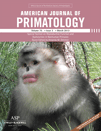
AMERICAN JOURNAL OF PRIMATOLOGY
Advancing Primate Science Through InnovationAMERICAN JOURNAL OF PRIMATOLOGY is a leading peer-reviewed journal published by Wiley that focuses on the rich and dynamic field of primate research. With an ISSN of 0275-2565 and an E-ISSN of 1098-2345, this esteemed journal has maintained its commitment to advancing knowledge in primatology since its inception in 1981. Recognized in the Q1 quartile for both Animal Science and Zoology and Ecology, Evolution, Behavior and Systematics, it is ranked 84th out of 490 in Animal Science, and 188th out of 721 in Ecology. By publishing high-quality research articles, reviews, and theoretical contributions, the journal aims to foster a deeper understanding of primate biology, conservation, and behavior, making it an invaluable resource for researchers, professionals, and students alike. While not an open access journal, it provides essential insights into primate science, ensuring that vital findings are accessible to a broad audience. For further details, visit their office at 111 River St, Hoboken 07030-5774, NJ, USA.

Evolutionary Human Sciences
Bridging Anthropology, Ecology, and Psychology for a Deeper UnderstandingEvolutionary Human Sciences, published by Cambridge University Press, is a premier open-access journal dedicated to exploring the multidisciplinary intersections of human evolution and behavior. Established in 2019, this journal has swiftly gained recognition, ranking in the Q1 category for Anthropology, Cultural Studies, and Ecology, Evolution, Behavior and Systematics, along with Q2 in Applied Psychology as of 2023. With a commendable Scopus ranking and impact factor reflecting its rigorous academic standards, Evolutionary Human Sciences provides a vital platform for researchers and professionals keen to advance the understanding of human behavior through the lens of evolutionary science. By offering a wealth of open access options, it ensures that groundbreaking research is readily available to scholars, students, and practitioners worldwide, fostering the dissemination of knowledge that is crucial for addressing contemporary challenges in human behavior and ecology.